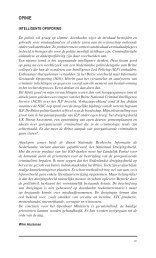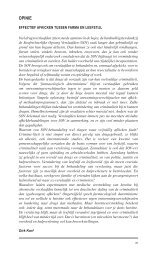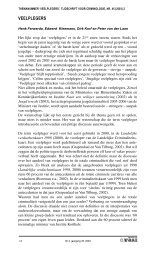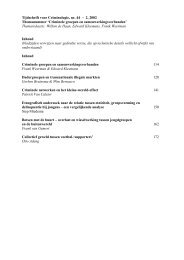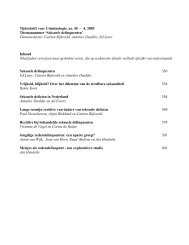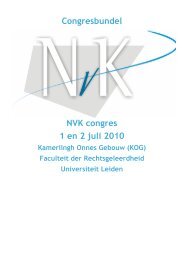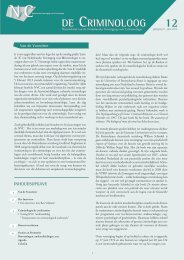Een Vlaamse spiegel - Nederlandse Vereniging voor Kriminologie
Een Vlaamse spiegel - Nederlandse Vereniging voor Kriminologie
Een Vlaamse spiegel - Nederlandse Vereniging voor Kriminologie
You also want an ePaper? Increase the reach of your titles
YUMPU automatically turns print PDFs into web optimized ePapers that Google loves.
Roaming offender groups – rational Dutch criminologists and irrational<br />
criminals in Flanders<br />
Ponsaers<br />
‘Roaming offender groups’ are high on the political agenda in Belgium.<br />
Though an anomaly, they may shatter a number of criminological accepted<br />
wisdoms and should make Dutch criminologists rethink some theory. Dutch<br />
criminology is influenced by theories linked to the ‘rational choice perspective’<br />
of offenders. What does the phenomenon mean for central suppositions in<br />
theory building and empirical research, such as modelling rational choice<br />
behaviour as individual choice behaviour and allocating a central role to the<br />
residential address of the offender?<br />
In Rembrandt’s country – group portrait of a company of guardians<br />
Cools<br />
Dutch scientific criminological interest towards commercial private policing<br />
and security in the 1970’s and 1980’s was based on a general distrust of<br />
the security industry, due to political experiences with private political<br />
organisations. This critical view changed into more international and policydriven<br />
thinking in the 1990s. Today Leiden and Nijenrode universities are<br />
creating a scientific network on forensic business studies and accountancy, and<br />
dominate scientific research. Nevertheless the bridge to a ‘law and economics<br />
approach’ has not yet been crossed, and private intelligence studies will be one<br />
of the future challenges. Recent evolution in the Netherlands is the result of a<br />
home-made effort, and research is less prejudiced than in Flanders.<br />
Conditional release in the Netherlands and Belgium<br />
Goethals & Maes<br />
Both the Netherlands and Belgium passed their conditional release legislation<br />
quasi-simultaneously at the end of the 19 th century. In Belgium, parole legislation<br />
remained quite stable, but in the Netherlands it was abrogated in 1986, with<br />
the substitution of conditional release by fixed parole. Nowadays, Dutch plans<br />
to reintroduce a model of conditional release offer interesting research perspectives<br />
in both countries, from a legal and an empirical perspective. Dutch<br />
researchers will be offered the opportunity to examine the problems and<br />
successes of both systems, such as whether discretionary conditional release,<br />
in contrast to fixed parole, leads to a decrease in recidivism.<br />
This may allow the establishment of a number of distinguishing factors:<br />
between parole success and failure; the effects from the discretionary character<br />
of granting parole in contrast to fixed conditional parole; the decision-making<br />
processes, underlying parole decision-making from a perspective of product<br />
and process; and the impact of the new system on prison capacity. All these<br />
(new) research questions can be approached from a national, but, more<br />
interestingly, also from an international comparative perspective, e.g. Belgium<br />
- Netherlands.<br />
82 Jubileumuitgave ‘<strong>Een</strong> <strong>Vlaamse</strong> <strong>spiegel</strong>’



